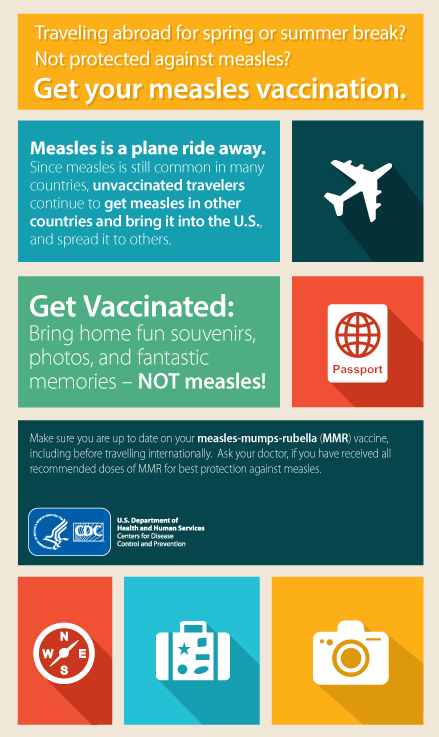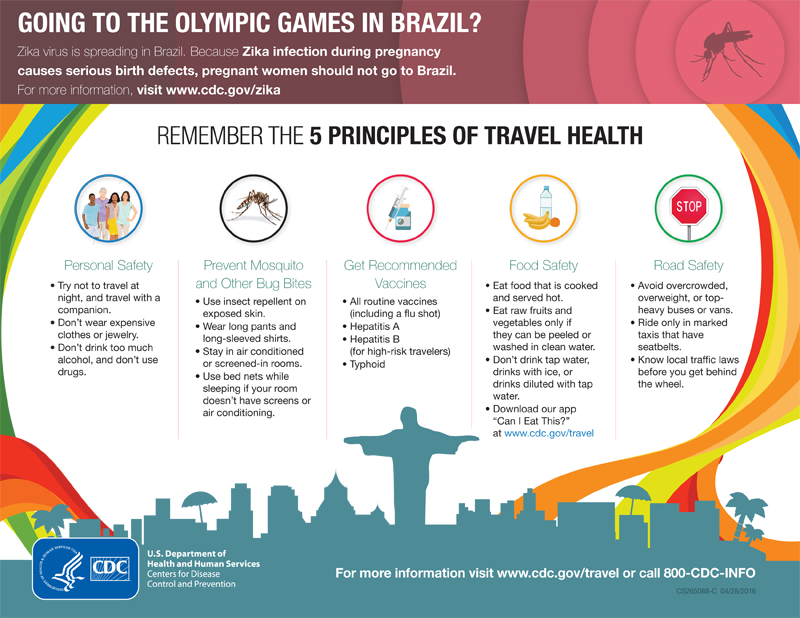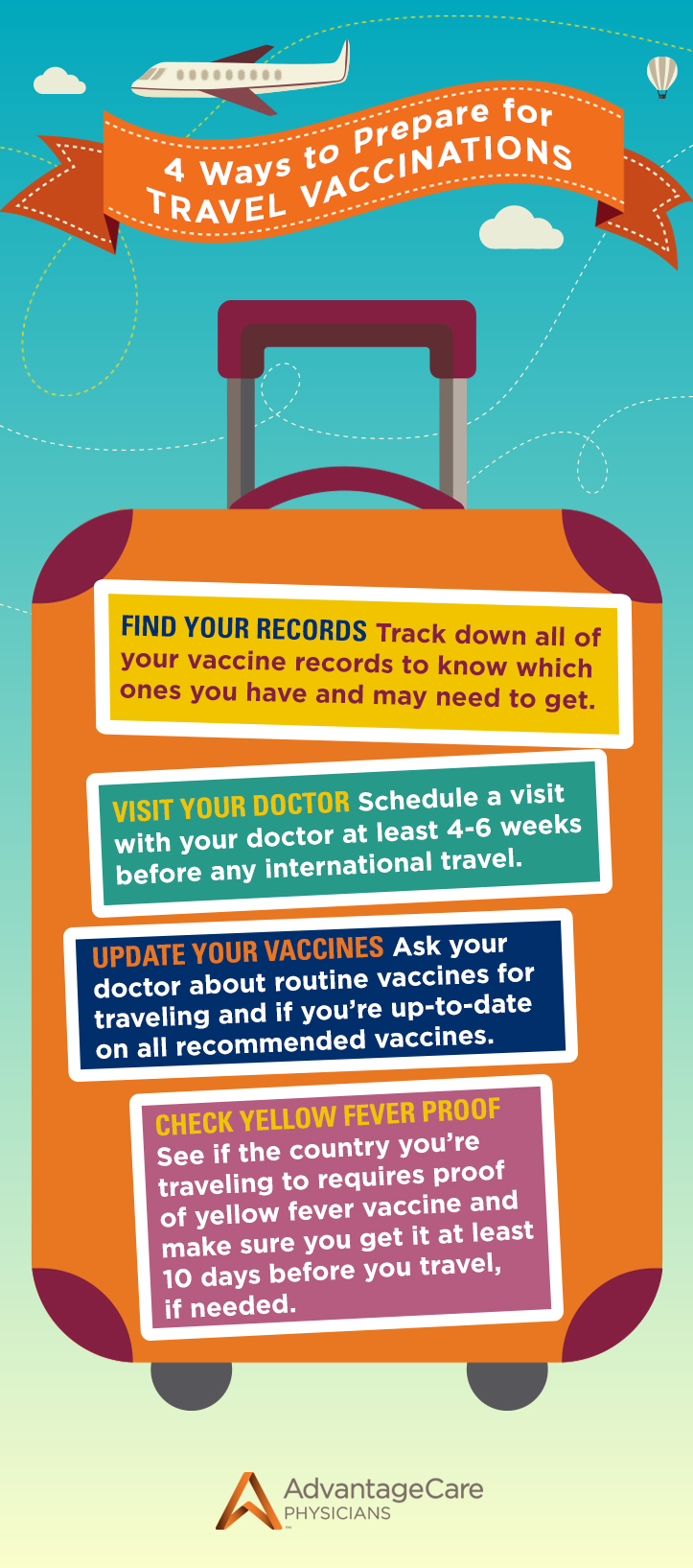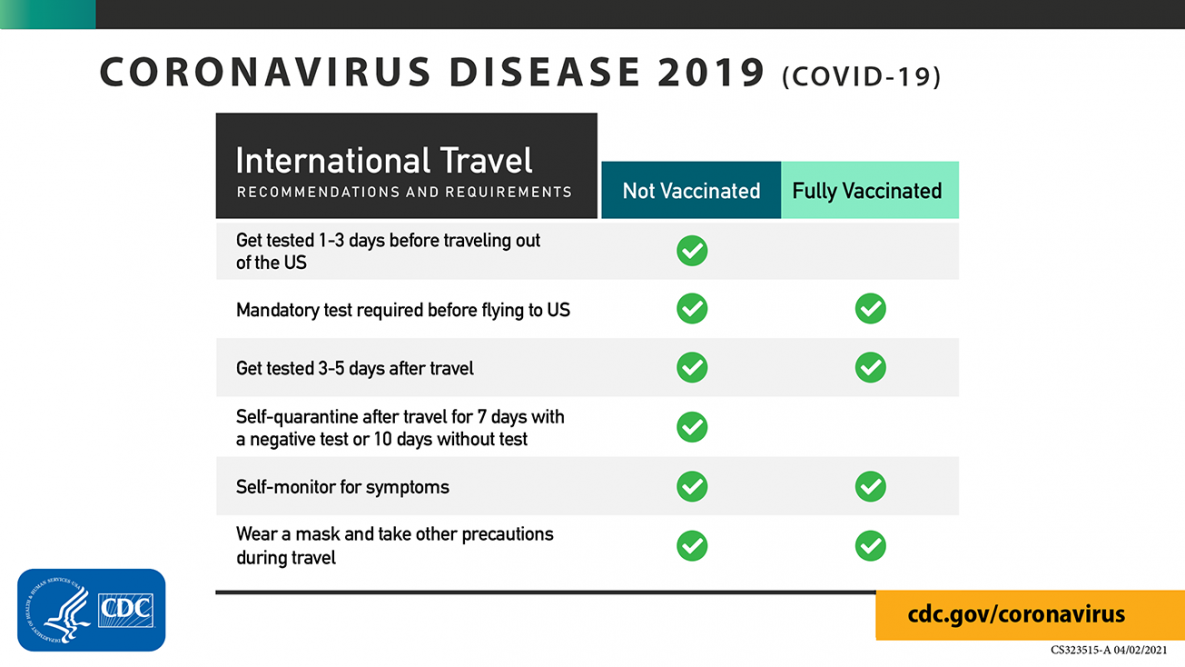Discover the recommended vaccinations before traveling abroad. Protect your health and enjoy a smooth journey with these essential precautions.
Planning a trip abroad can be an exhilarating experience, filled with anticipation for new adventures and cultures. However, amidst the excitement, it is crucial to prioritize our health and well-being. That is why understanding the vaccinations recommended before traveling abroad is essential. Taking the necessary precautions can help protect us from potential health risks and ensure a smooth and enjoyable journey. Whether we are exploring exotic wildlife in Africa or immersing ourselves in the vibrant streets of Asia, being armed with the right vaccinations can help us make the most of our international travels.

This image is property of www.cdc.gov.
Routine Vaccinations
MMR (Measles, Mumps, and Rubella)
When it comes to routine vaccinations, the MMR vaccine is an essential one to consider before traveling abroad. This vaccine protects against three highly contagious diseases: measles, mumps, and rubella. Measles, in particular, has seen a resurgence in recent years, making it crucial for travelers to ensure they are immunized. By receiving the MMR vaccine, we can protect ourselves and others from these preventable diseases.
Tdap (Tetanus, Diphtheria, and Pertussis)
Another routine vaccination to prioritize before international travel is the Tdap vaccine. Tetanus, diphtheria, and pertussis are all potentially severe illnesses that can be easily prevented through vaccination. Tetanus, commonly known as lockjaw, is caused by a bacteria found in soil, dust, and manure. Diphtheria is a respiratory infection spread through coughing and sneezing. Pertussis, also known as whooping cough, is highly contagious and can lead to severe coughing fits. By ensuring our Tdap vaccinations are up to date, we can protect ourselves and those we come into contact with during our travels.
Varicella (Chickenpox)
The varicella vaccine, often known as the chickenpox vaccine, is another routine vaccination to consider before traveling abroad. Chickenpox is a highly contagious disease that causes an itchy rash and can lead to complications, especially in adults. By receiving the varicella vaccine, we can not only protect ourselves from this uncomfortable illness but also help prevent the spread of the disease to vulnerable populations we may encounter during our travels.
Polio
Although polio has been successfully eradicated in many parts of the world, there are still a few countries where the disease remains a risk. It is essential for us to be vaccinated against polio before traveling to these regions to protect ourselves and ensure we do not contribute to the spread of this highly infectious virus. The polio vaccine is typically administered as part of the routine childhood immunization schedule, but it is important to check our vaccination records and receive any necessary booster shots before embarking on our travels.
Influenza
Seasonal influenza, commonly known as the flu, is a viral infection that can cause mild to severe illness. Getting vaccinated against the flu before traveling abroad is an important step in protecting ourselves and others from the virus. Influenza strains can vary by geographic region and time of year, so it is crucial to stay up to date and receive the appropriate flu vaccine recommended for our travel destination. By doing so, we can reduce our risk of falling ill and potentially spreading the flu to others.
Destination-Specific Vaccinations
Hepatitis A
Hepatitis A is a viral liver disease that can be contracted through contaminated food and water. It is particularly prevalent in areas with poor sanitation and hygiene standards. Before traveling to regions where hepatitis A is endemic or outbreaks have been reported, it is highly recommended to receive the hepatitis A vaccine. This vaccine provides long-lasting protection against the virus and can prevent potentially severe illness during our travels.
Hepatitis B
Similar to hepatitis A, hepatitis B is a viral infection that affects the liver. It can be transmitted through contaminated blood, sexual contact, or sharing needles. Travelers planning to engage in activities that increase the risk of exposure to hepatitis B, such as receiving medical treatment or getting a tattoo, should consider getting vaccinated. The hepatitis B vaccine is typically administered as a series of three doses, offering robust protection against the virus.
Typhoid
Typhoid fever is a bacterial infection caused by Salmonella Typhi, primarily transmitted through contaminated food and water. Travelers to regions with limited access to clean water and proper sanitation should strongly consider the typhoid vaccine. The vaccine is available in two forms: an oral capsule and an injectable form. Both options provide protection against this potentially severe illness and are worth discussing with a healthcare professional before traveling.
Yellow Fever
Yellow fever is a mosquito-borne viral disease that can cause severe illness and even death in some cases. Certain countries and regions require proof of yellow fever vaccination for entry, and even if not mandatory, it is highly recommended to receive this vaccine before traveling to areas where the virus is present. The yellow fever vaccine provides long-lasting immunity and is typically administered as a single dose. It is essential to check the requirements and recommendations for our specific travel destination.
Rabies
Rabies is a viral disease that affects the central nervous system and is transmitted through the bite or scratch of an infected animal. Travelers planning on engaging in outdoor activities or spending time in rural areas where rabies is prevalent should consider receiving the pre-exposure rabies vaccine. This vaccine, administered in multiple doses, provides an additional layer of protection and allows for a more straightforward post-exposure treatment if a potential exposure occurs.

This image is property of media.healthdirect.org.au.
Traveler’s Diarrhea Vaccination
Oral Rehydration Solutions (ORS)
One common health issue many travelers experience is traveler’s diarrhea. It is caused by consuming contaminated food or water and can quickly ruin a trip. While there is no specific vaccine for traveler’s diarrhea, avoiding contaminated food and water and practicing good hand hygiene are crucial preventive measures. In case of diarrhea, it is essential to stay well-hydrated by consuming oral rehydration solutions (ORS) to replace lost fluids and electrolytes.
Prescription Medications
In some cases, our healthcare provider may prescribe antibiotics or antidiarrheal medications to have on hand while traveling to manage severe cases of traveler’s diarrhea. These medications can be effective in reducing the duration and severity of symptoms. However, they should only be used under the guidance and recommendation of a healthcare professional.
Probiotics
Probiotics, available in supplement form or naturally present in some foods like yogurt, can potentially help prevent and alleviate symptoms of traveler’s diarrhea. These beneficial bacteria support a healthy gut microbiome and may help reduce the risk of diarrhea caused by certain pathogens. Incorporating probiotics into our routine before and during travel can be a helpful addition to our preventive measures for traveler’s diarrhea.
Malaria Vaccination and Prevention
Antimalarial Medications
Malaria is a serious and sometimes life-threatening disease transmitted through the bite of infected mosquitoes. Travelers to regions where malaria is endemic should take steps to prevent mosquito bites and consider taking antimalarial medications as recommended by healthcare professionals. These medications are typically taken before, during, and after the trip to provide the most effective protection against the disease. It is crucial to start the medication regimen before travel as some medications may need to be initiated well in advance.

This image is property of nfid.files.wordpress.com.
Japanese Encephalitis Vaccination
Vaccine Availability
Japanese encephalitis is a viral infection transmitted by mosquitoes, mainly in rural agricultural areas of Asia. While a vaccine is available to protect against Japanese encephalitis, the risk of exposure and the need for vaccination depends on the specific travel itinerary. Vaccination should be considered if traveling to high-risk areas during the transmission season or for prolonged periods. The vaccine is administered in two or three doses and provides long-lasting protection against this potentially severe illness.
Risk of Japanese Encephalitis
The risk of contracting Japanese encephalitis varies depending on the destination, season, and activities planned during travel. It is important to note that most travelers to endemic areas do not get infected. The risk is higher for those who spend a lot of time outdoors, especially in rural areas, and during peak mosquito activity. Understanding the specific risk factors and consulting with a healthcare provider can help determine if vaccination against Japanese encephalitis is necessary for our travel plans.
Meningococcal Disease Vaccination
Types of Meningococcal Vaccines
Meningococcal disease is a bacterial infection that can cause meningitis and other severe illnesses. There are different types of meningococcal vaccines, including the quadrivalent vaccine, which protects against four types of meningococcal bacteria (A, C, W, and Y), and the serogroup B vaccine, which provides specific protection against serogroup B bacteria. The specific vaccine recommendation may vary depending on the travel destination and individual factors.
Vaccine Recommendations
Vaccination against meningococcal disease is typically recommended for travelers visiting regions known as the “meningitis belt” in sub-Saharan Africa, as well as for those planning to participate in activities that increase the risk of exposure, such as crowded mass gatherings. The choice of vaccine and number of doses will depend on various factors, including age, previous vaccination history, and the specific risks associated with the travel itinerary.
Meningococcal Disease Risk
Meningococcal disease is most commonly spread through respiratory droplets, such as coughing and sneezing, or close contact with an infected person. The risk of contracting meningococcal disease can vary depending on the destination and the specific activities planned during travel. Understanding the potential risks, being aware of any outbreaks or increased prevalence in the region, and consulting with healthcare professionals can help determine the need for meningococcal vaccination for our travel plans.

This image is property of www.acpny.com.
Tick-Borne Encephalitis Vaccination
Tick-Borne Encephalitis Risk Areas
Tick-borne encephalitis is a viral infection transmitted through the bite of infected ticks. The risk of tick-borne encephalitis varies depending on the geographic region, specific activities during travel, and the time of year. Certain areas in Central and Eastern Europe, as well as parts of Russia and Asia, are known to have a higher prevalence of tick-borne encephalitis. Travelers planning to visit these areas, especially during the warmer months, should consider vaccination.
Vaccine Effectiveness
Vaccination is the most effective way to protect against tick-borne encephalitis. The vaccine is typically administered in two or three doses, depending on the specific vaccine used. It is important to note that the vaccine does not provide immediate protection, and the full course of vaccinations should be completed well in advance of travel to ensure optimal immunity against tick-borne encephalitis.
Vaccine Availability
The availability of the tick-borne encephalitis vaccine may vary depending on our location and healthcare provider. It is recommended to consult with a healthcare professional or travel medicine specialist to assess the specific risks of tick-borne encephalitis based on the travel itinerary and determine the availability of the vaccine. This will ensure that we receive the necessary vaccinations to stay protected during our travels.
Cholera Vaccination
Vaccine Availability
Cholera is a bacterial infection that can cause severe diarrhea and dehydration. Vaccination against cholera is available and can be considered for travelers to areas with ongoing cholera outbreaks or endemic regions with limited access to safe drinking water and sanitation. The vaccine is typically administered as an oral vaccine in the form of a drink and may require multiple doses for optimal protection.
Recommendations for Cholera Vaccination
The decision to receive the cholera vaccine should be based on careful consideration of the specific travel destination, the sanitary conditions, the time of year, and the individual’s risk tolerance. In some cases, the benefit of vaccination may outweigh the risks associated with the vaccine itself. Consulting with a healthcare professional or travel medicine specialist is crucial in making an informed decision about cholera vaccination for our travel plans.

This image is property of www.spencerhospital.org.
Pneumococcal Disease Vaccination
Pneumococcal Vaccine Types
Pneumococcal disease is an infection caused by Streptococcus pneumoniae bacteria, which can lead to pneumonia, meningitis, and other severe illnesses. There are two types of pneumococcal vaccines available: the pneumococcal conjugate vaccine (PCV13) and the pneumococcal polysaccharide vaccine (PPSV23). The specific vaccine recommendation may depend on various factors, including age, medical history, and underlying health conditions.
Who Should Get Vaccinated?
Vaccination against pneumococcal disease is typically recommended for certain high-risk groups, such as young children, adults over the age of 65, and individuals with certain medical conditions, including chronic lung or heart disease. Travelers belonging to these high-risk groups should ensure they are up to date with their pneumococcal vaccinations to reduce the risk of pneumococcal disease during their travels.
Pneumococcal Disease Risk
The risk of pneumococcal disease can vary depending on several factors, including age, overall health status, and the specific travel destination. Pneumococcal disease is often transmitted through respiratory droplets or close contact with infected individuals. Understanding the potential risks and consulting with healthcare professionals can help determine the need for pneumococcal vaccination for our travel plans.
Additional Considerations
Timing of Vaccinations
It is crucial to plan ahead and allow enough time for vaccination before traveling abroad. Some vaccines may require multiple doses or time to build immunity, while others may require specific intervals for optimal effectiveness. Ideally, we should schedule a pre-travel medical consultation with a healthcare professional or travel medicine specialist at least 4-6 weeks before our departure to ensure adequate time for vaccinations and any necessary follow-up doses.
Documentation and Record-Keeping
Keeping a record of our immunizations is essential for our own reference and for potential travel requirements. Before traveling abroad, we should gather and organize our vaccination records to ensure we have proof of immunization if needed. This documentation may be required for visa applications or entry into certain countries with mandatory vaccination policies. Additionally, having a clear record of our vaccinations can help healthcare professionals provide better care if we need medical assistance while abroad.
Pre-Travel Medical Consultation
A pre-travel medical consultation is highly recommended for anyone planning to travel abroad. During this consultation, we can discuss our specific travel plans, medical history, and any pre-existing health conditions with a healthcare professional or travel medicine specialist. They will provide personalized recommendations for vaccinations, preventive medications, and general health advice based on our unique circumstances. This consultation is an opportunity to address any questions or concerns we may have and ensure we are well-prepared for a safe and healthy trip.
In summary, vaccinations play a vital role in protecting ourselves and others from preventable diseases while traveling abroad. Routine vaccinations such as MMR, Tdap, varicella, polio, and influenza should be up to date to ensure optimal immunity. Destination-specific vaccinations, including those for hepatitis A, hepatitis B, typhoid, yellow fever, rabies, and others, should be considered based on the specific travel itinerary and potential exposure risks. Additional measures like traveler’s diarrhea prevention, malaria prevention, and pre-travel medical consultations further enhance our health and safety during our international journeys. By taking these proactive steps, we can embark on our adventures with peace of mind, knowing we have done our part to stay healthy and protect ourselves and those we encounter along the way.



